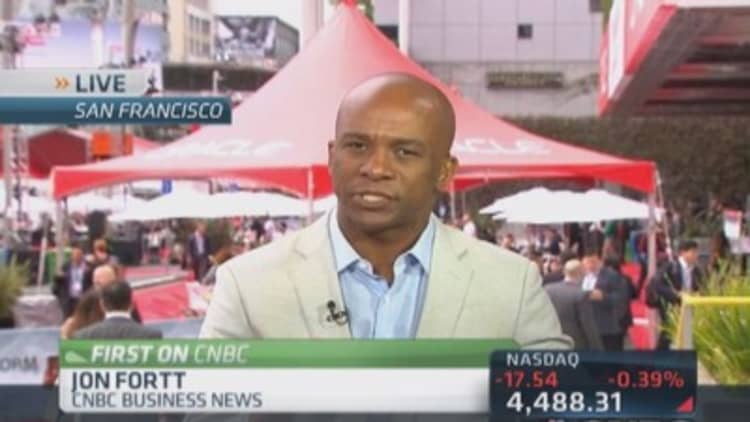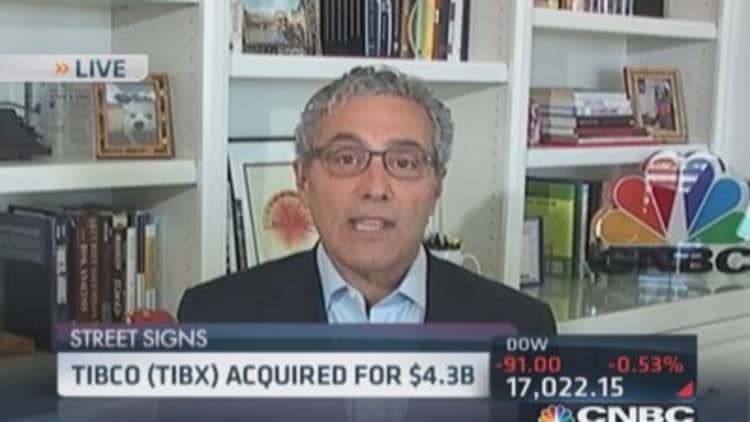
CEO Safra Catz says some are underestimating Oracle in the cloud era yet again, because they don't see the long game the company's playing.
In a rare interview with CNBC at the OpenWorld conference in San Francisco, Catz said Oracle's focus on vertical integration will work in the cloud as it did in enterprise software overall, boosting margins and fueling growth. (Catz shares the CEO title with Mark Hurd; founder Larry Ellison is executive chairman.) The vision question is especially important at this OpenWorld, with Oracle presenting its platform-as-a-service vision, which will put it head-to-head with Microsoft and its new CEO Satya Nadella.
Over the course of the conversation, she also dismissed skeptics who have said Ellison is stepping back from the business, or that the shift in executive titles was anything but orderly. She, Ellison, Hurd and others continue to be a smoothly functioning team, she said. "I love these guys."
On the mergers and acquisitions front, Catz directly answered the question of why Oracle didn't buy Tibco Software, which Monday announced plans to sell itself to a private equity firm for $4.3 billion.
"Ask yourself: How would Tibco advance the agenda for our customers?" Catz said. "We have complete overlap with their product lines. They've all standardized on Weblogic, BEA, Fusion Middleware, many are moving now to Exalogic to run it. What does Tibco add to that?

"Every one of Tibco's customers is already here. Sometimes you have the new technology that you've either built or bought, and you have the old technology. But sometimes there's so much friction in the system of moving them from one to the other, it isn't really worth doing. ... In that case, our conclusion is, that's just too much work."
That said, the executive team at Oracle still constantly looks at acquisition ideas, using a mock-debate style to be sure they make sense.
Watch more: Oracle's dual CEOs
"Somebody has an idea. Whatever the idea is, there's a bunch of us who argue, 'What's the reason not to do it?' Then if we all of a sudden get, 'bad idea,' we switch sides and start arguing why to do it," Catz said. "The way deals are done, every idea is looked at 50 different ways. Now, the market continues to change all the time. And we are always looking at everything in evaluating how it fits with our strategy."
The tension in so much of the enterprise software business these days is between growing the top line, which start-ups like Salesforce and WorkDay are doing aggressively, and preserving or expanding margins. Catz said that Oracle can balance the two, even as Ellison vows to compete on price in infrastructure as a service against the likes of Google and Amazon.
Oracle has a cost advantage from running its own software—"It's like eating out versus cooking at home"—plus she believes cloud infrastructure customers will buy more than just compute cycles. "Nobody says, 'Oh, infrastructure as a service is all I want," she said, likening it to going to Target for a sweatshirt and leaving with Doritos and headphones.
On the question of hardware, which Oracle highlighted in a recent proxy filing for growing more slowly than expected, Catz said Oracle's higher-margin engineered systems, which now represent about a third of the hardware business, continue to grow. As sales of lower-value systems continue to decline, and as more customers see the value in Oracle's approach, the strategy will be validated.
Read More Michael Dell on the state of PCs and going private
"Hardware ultimately is a scale game and it's a differentiation game," Catz said. "If you are literally selling products that are completely undifferentiated, like x86 servers, why would anybody pay you for that? You don't deserve a profit for that, unless you are—some people are in that business because they're the biggest guys. They get such economies of scale that though they make 50 cents on every one, 50 cents here, 50 cents there, before you know it it's 500 million. But for us, we've never been about being undifferentiated."
Catz also dismissed rival SAP's $8 billion plan to acquire Concur, announced this month on the same day as her ascension to CEO. "I remember thinking to myself, 'Oh my gosh, this acquisition of Concur is the best thing that's happened to me today."
That's because from her perspective SAP bought a midmarket business that specializes in just expenses in the cloud, a narrow portion of the enterprise resource planning suite Oracle already has. "And," Catz said, "they spent all of their money."


